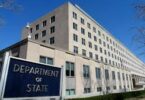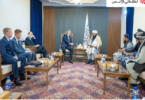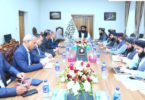LONDON (BBC): Dozens of former military commanders have called on the government to allow more Afghans who worked for British forces to resettle in the UK.
Ministers have recently expanded the UK’s relocation scheme for Afghans.
But in a letter to the PM, the group said they were “gravely concerned” about hundreds of interpreters who have had their applications rejected.
The MoD said it had already supported more than 2,200 former Afghan staff and their families to resettle in the UK.
Those who have signed the letter include four former chiefs of the defence staff, Lord Boyce, Lord Stirrup, Lord Richards and Lord Houghton; two former heads of the British Army, Sir Peter Wall and Lord Dannatt; Lord Ricketts, the former national security advisor, and former Defence Minister Johnny Mercer, who served as a soldier in Helmand.
Their letter says: “Too many of our former interpreters have unnecessarily and unreasonably been rejected… We strongly urge that the policy is reviewed again immediately, to ensure more are given sanctuary”.
“If any of our former interpreters are murdered by the Taliban in the wake of our withdrawal, the dishonour would lay squarely at our nation’s feet,” it adds.
Former Afghan interpreters fear death after UK exit
Afghan interpreters’ visa ‘anguish’
In May, Defence Secretary Ben Wallace announced plans to accelerate the relocation of hundreds more Afghan interpreters to the UK, following the decisions by US and Nato forces to leave the country.
Under the expanded Afghan Relocation and Assistance Policy (ARAP) the government said another 3,000 former interpreters and their families would be allowed to settle in the UK.
But the letter highlights the cases of many interpreters who are among the 35% of staff who were dismissed from service for various reasons “without any due process or ability to appeal their dismissal”.
President Joe Biden has vowed to speed up the special US visa programme for Afghans who worked for the Americans.
Around 20,000 have applied – but only about 4,000 have so far been approved, according to the State Department.
A bill is currently making its way through Congress to increase the number of available visas by 8,000 but is yet to be passed by the Senate.
Other Nato members are also under pressure to speed up the relocation process for Afghan nationals who supported their troops.
In June, the German government announced that Afghans who worked for them from 2013 onward may apply to come to Germany. This was previously limited to the past two years only.
But every application is assessed individually, which is making this a slow process.
Other countries – such as the Netherlands and Australia – have been criticised for requiring Afghans to fill in long, complicated forms which place an unrealistic burden on applicants to prove they are at risk.
line
Hamdar, not his real name, worked as a translator for British forces in Afghanistan’s southern Helmand province between 2011 and 2014.
He says his contract was terminated because he refused to clean the latrines after returning from three back-to-back patrols. He says it wasn’t his job.
Speaking from his home near Kabul, where he is in hiding with his wife and 10-month-old daughter, he told the BBC: “The Taliban don’t care if I was dismissed or fired…. All they care is that I worked for the British and anyone who worked for the British, they’re gonna kill us.”
The Sulha Alliance, which is campaigning for the rights of former Afghan interpreters, and which co-ordinated the letter, claims the government only expects to relocate a maximum of 800 interpreters and their families under the ARAP scheme.
It says that number is less than a third of the 3,000 interpreters who worked for the UK. Nor does it include other locally hired staff who were not in an “exposed role”, such as cooks and gardeners.
The Sulha Alliance, which is run by former British army officers, says the number needs to be “dramatically increased”.
In a statement, a Ministry of Defence spokeswoman said: “We owe a huge debt of gratitude to interpreters who risked their lives working alongside UK forces in Afghanistan and the government has already supported over 2,200 former Afghan staff and their families in creating new lives in the UK.”
But it said those who were dismissed for the most serious offences, including those that constitute a crime in the UK, or would be a security concern, would continue to be excluded.
Since the expanded ARAP scheme was announced there have been regular flights from Afghanistan bringing former interpreters and their families to the UK.
The case of “Ali” was highlighted by the BBC last year. He arrived in the UK with his wife and four daughters on Monday night. His original request to relocate was rejected, but he has now been resettled under the new rules.
Speaking to the BBC on his arrival, Ali – not his real name – expressed his gratitude to the British government for bringing his family to safety.
“Now we have a safe life and we are very happy,” he said. “And it’s clear to me and my family that if we had been left behind in Afghanistan, I’m sure they will kill me. And not only me, my family, my wife.
“So I will always be thankful to the UK government who helped me. I hope that they continue the process further to bring here those who are still in Afghanistan.”






